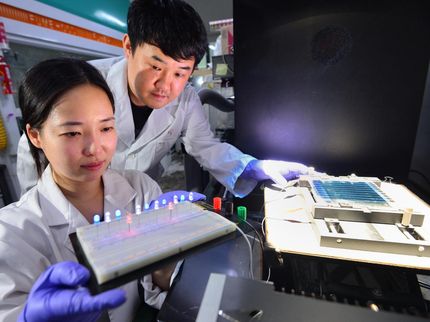Researcher awarded with »Green Photonics« Award for Organic Solarcells
Jan Meiß has developed transparent organic solar cells with high efficiency
Scientist Jan Meiß has been awarded with the »Green Photonics« for young academics on April 23, 2012 at the Hanover Fair. Within his dissertation in cooperation with Heliatek GmbH and Fraunhofer IPMS – COMEDD he succeeded in the development of new concepts for organic solar cells with high impact: his solar cells are four times more efficient as conventional organic solar cells.
Producing electricity from sun light sounds easy and tempting. But photovoltaics came under criticism because of its high costs. Depending on the type of the solar cells costs are caused by rare and expensive materials.
The so called »organic photovoltaic« (OPV) – also known as »plastic solar cells« – has a high potential for the reduction of costs. The technology is now ready to enter the market and can be carried out under low temperatures (< 400°C) using cost-saving materials and the complete solar cell could be thinner than 500 nanometers! Organic materials are dyes based on carbonates, well known in the daily life as food colorant or car finish. The vision is a light weight, thin solar cell at plastic foil with a weight of 500 g per square meter active solar cell area, which can be rollable, transportable and easy integrable. Especially transparent devices are high of interest for the integration of photovoltaic into faces of buildings or »power windows« – windows, which can be used as a sunscreen as well as power generator.
The dissertation of Jan Meiß resulted in important progress for organic solar cells: he developed amongst others alternatives to conventional transparent conductive layers (e.g. ITO – Indium-Tin-Oxid), which can conserve resources, save costs and are easy to produce.
Jan Meiß says: »Because of an optimized layer composition we succeded in the development of an organic solar cell with an efficiency of 4,9% and a transmission of 20%. This means: one-fifth of the irradiated light goes completely through the organic solar cell. The efficiency of the transparent organic solar cell has been seven times higher as known from literature and is unbeaten until now.«
»Green Photonics« award young academics, who work on innovative optical technologies with economically potential for a sustainable life. Jan Meiß has achieved this objectives with his dissertation at the Technical University of Dresden (IAPP) with support of Heliatek and the Fraunhofer IPMS – COMEDD. The TU Dresden and Fraunhofer IPMS – COMEDD has established a cooperation model »Innovationscampus« for R&D of novel organic devices.
Most read news
Organizations
Other news from the department science

Get the chemical industry in your inbox
By submitting this form you agree that LUMITOS AG will send you the newsletter(s) selected above by email. Your data will not be passed on to third parties. Your data will be stored and processed in accordance with our data protection regulations. LUMITOS may contact you by email for the purpose of advertising or market and opinion surveys. You can revoke your consent at any time without giving reasons to LUMITOS AG, Ernst-Augustin-Str. 2, 12489 Berlin, Germany or by e-mail at revoke@lumitos.com with effect for the future. In addition, each email contains a link to unsubscribe from the corresponding newsletter.


























































